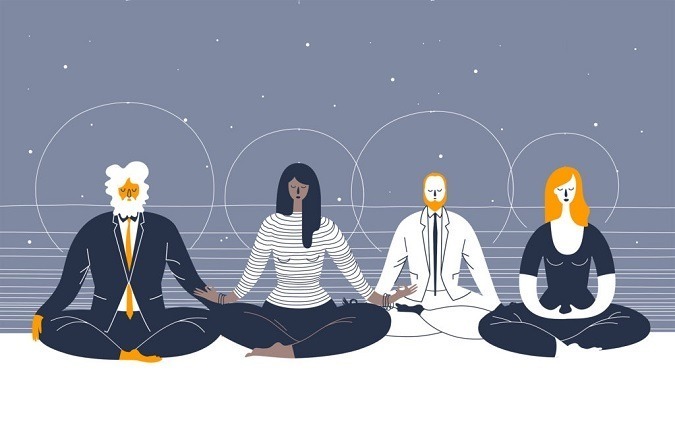Study finds a key ingredient in mindfulness training: Acceptance (not acquiescence)
 Life can be stressful. Whether it’s the stress that comes with having too much work to do in too little time, fulfilling caregiving obligations, or dealing with a major illness or setback, sometimes it can be hard to cope.
Life can be stressful. Whether it’s the stress that comes with having too much work to do in too little time, fulfilling caregiving obligations, or dealing with a major illness or setback, sometimes it can be hard to cope.
In response to stress, many people today are turning to meditation or mindfulness apps (myself included). But not all mindfulness practice is equally effective for combating stress, a new study suggests. It’s possible that some of our practices may be missing a vital ingredient: acceptance.
In this study, researchers randomly assigned 137 stressed adults of various ages and ethnicities to one of three programs: an eight-week Mindfulness-Based Stress Reduction (MBSR) course, where they learned to mindfully pay attention to their present-moment experiences in an accepting, nonjudgmental way; an MBSR course without instructions on acceptance; or no course. The courses included many lessons—for example, how to pay attention to your breath and your body sensations, and how to eat food or take a walk mindfully—as well as practice time outside of class. Before, during, and afterwards, participants reported five times daily about how stressed they felt in the moment and whether they’d experienced a stressful event since their last report.
Though all of the groups experienced less stress and fewer incidents of feeling stressed over time, the people who took the full MBSR course had a significantly steeper improvement than the other two groups.
“Learning how to accept your present-moment experience is really important for reducing stress,” says Emily Lindsay, one of the study’s coauthors. “It seems to be a key element of mindfulness training.”
Mindfulness practices that specifically emphasize acceptance teach us a nonjudgmental attitude toward our experiences—meaning, learning not to label our thoughts, feelings, or experiences as good or bad, and trying not to change or resist them in any way. While many mindfulness courses include instructions in acceptance as par for the course, those that don’t may not be as effective.
This finding fits in with other research on the centrality of acceptance in mindfulness practice, says Lindsay. People who learn to accept and not just notice their experiences become less prone to mind-wandering, which has been tied to well-being, and less reactive to stress—meaning, they show reductions in systolic blood pressure, the stress hormone cortisol, and feelings of stress in a stressful situation. Her recent study adds to these results by monitoring participants daily, helping to show that acceptance makes a difference in everyday life situations and not just in the laboratory.
Why might acceptance be important? Lindsay argues that when people accept difficult experiences (like stress), it allows the experiences to “run their course and dissipate,” while resisting them only makes them stronger. And, she adds, accepting stress helps people to stop focusing only on what’s wrong and to notice other feelings, sensations, and thoughts occurring at the same time, enabling them to see the “bigger picture.”
“Stress diminishes as you take in more of your experience,” she says. “That’s the transformative part.”
Acceptance is not about acquiescing to your fate, though, says Lindsay—like getting a diagnosis of a terminal illness and just accepting that you’re going to die. That kind of “acceptance” leads to worse outcomes, she says. Nor is it about accepting poor treatment from other people. It’s more about accepting your internal experience—your thoughts and feelings—which informs you about how to respond to your external circumstances in a wiser way. For example, if you feel angry and accept your anger in the moment, it may prevent you from lashing out at someone and help you see that your feelings aren’t their fault.
Lindsay allows that some people find it hard to accept their unpleasant thoughts and feelings, but MBSR courses offer techniques that can help. For example, teaching people to name their feelings or thoughts in a calm, gentle tone (“I’m feeling sad and that’s OK”) can promote more acceptance, she says, as can practicing self-compassion.

“Clearly, we need to emphasize acceptance techniques a little more,” says Lindsay. That’s true in formal programs like MBSR, but also in our own individual practice.
I, for one, plan to do just that.
— Jill Suttie, Psy.D., is Greater Good‘s book review editor and a frequent contributor to the magazine. Based at UC-Berkeley, Greater Good highlights ground breaking scientific research into the roots of compassion and altruism. Copyright Greater Good.


